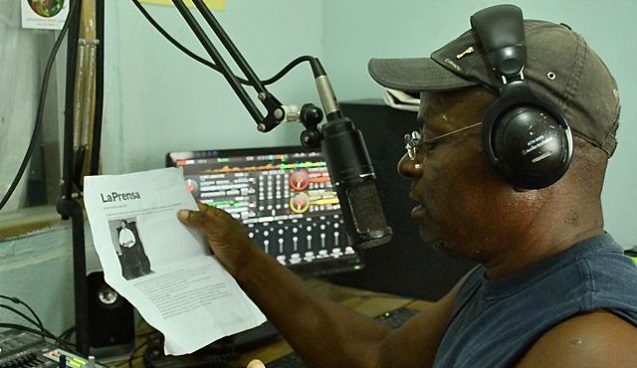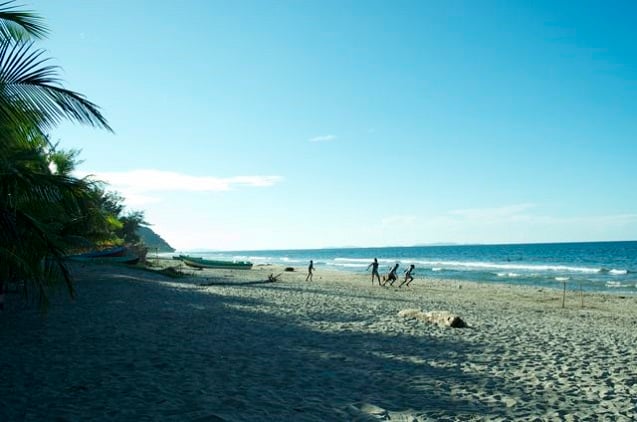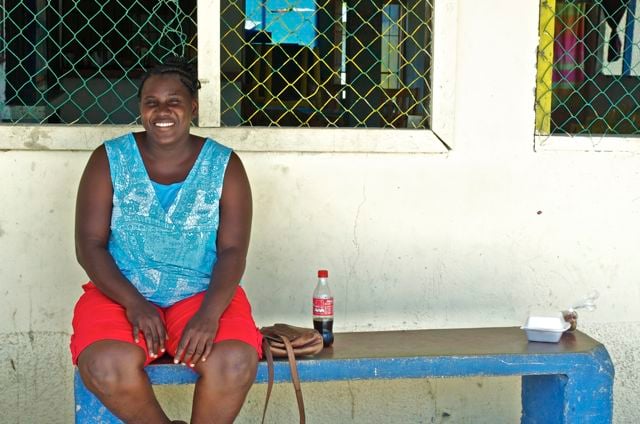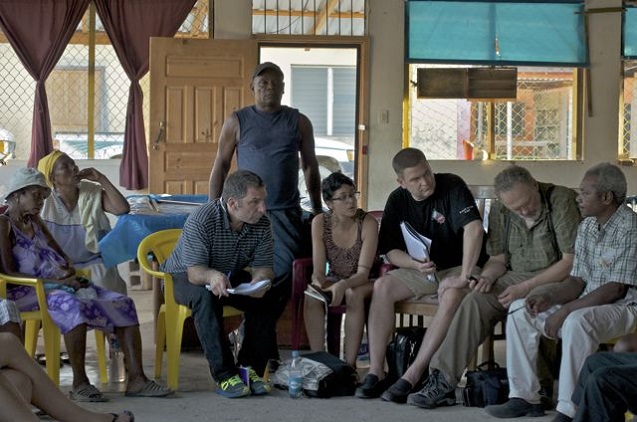Truthout is an indispensable resource for activists, movement leaders and workers everywhere. Please make this work possible with a quick donation.
“When was the last time I was threatened?” asks Alfredo Lopez, repeating my question. He laughs and then responds, “Today, yesterday, the day before, everyday. They tell me they want to mess me up.”
Lopez is the vice president of the Honduran Black Fraternal Organization (OFRANEH) and speaks with such a jovial tone that you wouldn’t guess that he’s talking about pre-election violence in Honduras. We’re in the Afro-Indigenous Garífuna town of Triunfo de la Cruz in the northern coast of Honduras. The first true presidential elections, since the 2009 coup that ousted president Mel Zelaya, are just days away.
Lopez is the host of the Notibimetu show on the Faluma Bimetu (Sweet Coconut) FM radio station. We accompany him to his afternoon program where he plays traditional Garifuna music, coupled with local and international news focused on land struggles of indigenous communities. The station has been a stalwart of “La Resistencía,” the resistance movement birthed in the aftermath of the 2009 coup d’etat.
 Alfredo Lopez speaks about the elections on his program Notibimetu show on the Faluma Bimetu (Sweet Coconut) FM radio station. (Photo: Andalusia Knoll)
Alfredo Lopez speaks about the elections on his program Notibimetu show on the Faluma Bimetu (Sweet Coconut) FM radio station. (Photo: Andalusia Knoll)
His phone rings various times during the program, but he doesn’t answer, citing it as another example of people trying to disrupt his activities. Lopez and OFRANEH have been involved in a long battle to protect their fertile coastal collective land from international investors attempting to turn these pristine coasts into a Honduran Cancun.
Repression of their movement to defend their land has increased in the pre-election season, but it is hardly something new to their community. Lopez himself served six years in jail for false drug charges. He was later released, vindicated of all charges and granted a retribution payment. In 2009, Faluma Betu was burned down by arsonists assumed to be linked to the coup government. The community’s resilience allowed them to reconstruct the station. A month later, they were back on the air, transmitting at double the station’s prior wattage.
Current Honduran President Porfirio Lobo Sosa held a conference in 2011 titled “Honduras, Open For Business.” The 46 Garifuna communities dotting the coast have never advertised that they are open for investment, but the fact that they haven’t given their consent has made little difference to the powerful businessmen vying for their chunk of Honduran beachfront property. According to Convention No. 169, all indigenous and tribal peoples have the right to “decide their own priorities,” especially when it “affects their lives, beliefs, institutions and spiritual well-being and the lands they occupy.” The lack of consent has formed the basis for three cases that OFRANEH has before the Inter-American Commission on Human Rights in Washington, DC, and two cases that have passed on to the Inter-American Court of Human Rights in Costa Rica.
 Many foreign investors have their eyes set on these pristine beaches communally owned by the Garífuna community. (Photo: Andalusia Knoll)
Many foreign investors have their eyes set on these pristine beaches communally owned by the Garífuna community. (Photo: Andalusia Knoll)
While these pending cases have helped throttle the development, they surely have not been able to stop it. In 2011 the Honduran National Congress approved the Law for Special Development Regions (RED) which allows the development of Charter Cities, which will operate autonomously from state jurisdiction and be allowed to enter into agreements with international agencies.
Tim Russo, a community media activist with the organization Popular Communicators for Autonomy (COMPPA), has worked in Honduras over the past decade and tells Truthout that the Charter Cities, with “their level of autonomy and all the special regulations that apply to the RED zones, are basically a Honduran version of the Green Zone in Iraq. But supposedly this is not a war zone.”
Just recently The Los Micos Golf Resort opened up in the nearby Tela Bay, with 750 acres of beach houses and a hotel, despite countless protests by local Garífuna organizations. The project has been financed by Randy Jorgensen, a Canadian businessman who struck it rich in the porn industry and told Kaelyn Forde of the Real News Network that “We want to bring back life to the banana booms,” referencing the Banana Republic that Central America was once considered. Jorgensen denied usurping communal Garífuna land and stated that which borders delineate the community and individual land is “a debate that they need to have amongst themselves.”
Members of the Garífuna community are not opposed to tourism and in fact are in favor of development it as long as guarantees dignified work with fair wages for local residents, coupled with the protection of the collective land, crops and ocean. One example of community-led tourism is the Panchy Cabanas, where close to a hundred foreigners have stayed in the pre-election season. These visitors hailing from Canada, Germany and the United States have not come to catch the waves, but instead to participate in various international delegations that will monitor the elections.
The upcoming elections are the first that Honduras has seen since 2005, because the 2009 elections in which Pepe Lobo was elected were boycotted by many in protest of the coup government. According to a recent Gallup poll, Xiomara Zelaya de Castro, wife of ousted president Mel Zelaya, candidate with the new political party Libre, holds a few point margin over the ruling National Party Candidate, Juan Orlando Hernández. Yet journalists and election observers have questioned why the margin is so small, pointing to National Party-ruled congress funding of the poll. Regardless of Xiomara’s supposed lead in the polls, no one in the streets responds with any kind of certainty regarding Honduras’ next president. In a country where corruption and political violence is rampant, people’s faith that their vote will be respected is incredibly low.
 Clara Flores, the President of the Community Board of Triunfo de la Cruz sits in front of the town community hall where bribes were being offered to potential voters. (Photo: Andalusia Knoll)
Clara Flores, the President of the Community Board of Triunfo de la Cruz sits in front of the town community hall where bribes were being offered to potential voters. (Photo: Andalusia Knoll)
The international delegations are meeting with Lopez and other members of OFRANEH at the town pool hall that also serves as a community center. Outside, three young Rastafari men sit on the curb, kicking back as the sun sets on this beach town. They share with Truthout their nicknames Dibu, Capri and Diablo and their desire for change.
Unemployment has skyrocketed since the coup, and these three have found themselves without work. Capri and Dibu said they worked in construction in a nearby port town, but when the company got wind that they were part of the resistance, they were laid off. Diablo is a craftsmen and says that his cash flow has been low because the increased violence in post-coup Honduras has severely reduced the number of tourists coming to Triumfo and that while flinging its arms open to foreign investment, Honduras has also opened the floodgates to Chinese imports, making hand-crafted goods, which cost more, less desirable.
When questioned whether they are afraid to vote, all respond with a confident “no,” but say this sense of security is only because they will be voting in their local Garífuna community. Dibu says that some folks told them “if you go over there to vote, people will kill you.”
While they say they don’t fear for their lives in the elections, they do say they have seen a climate of intimidation and bribes. Clara Flores of OFRANEH confirmed this in an interview with Truthout, saying that people in the community “fear what will happen if the Libre party wins because they think that there might be another coup d’etat or action take against the president.” She also mentioned that people connected to the National Party offered 10,000 lempiras, the equivalent of 500 dollars to people in Triunfo in exchange for their vote. “This money was supposed to be money from the government for poor people, but since Juan Orlando was the head of congress, he is using these funds to influence the people’s vote.” In a community with high levels of unemployment, some were bought off, but Dibu says the majority of people “know what’s up” and with “a strong desire for change, they are not so easily willing to sell their votes.”
The Supreme Electoral Tribunal has prohibited people from entering the voting polls with their cellphones to prevent them from taking photos of their poll, which they would later present to the political party who bought off their vote to receive their reward money.
Seventy-five miles away in the nearby Garífuna community of Sanbo Creek, COMPPA and various community radio broadcasters are meeting to coordinate election coverage with FM, internet transmissions and segments uploaded to a community radio network website.
DJ Antony Norales from the station Community Radio Sugua speaks about the fears they have in operating an elections broadcast. “We were planning to close the station on election day. I live next to the school [where the voting polls will be located], and I have seen how everything is militarized. The police arrive with the soldiers and their huge cannons on the front of their vehicles ready to kill us. And they are the ones who are taking care of the ballot box?”
Honduran soldiers are deployed throughout the country and the police have also become increasingly militarized. Presidential Candidate Hernández introduced a proposal to Congress to to grant constitutional standing to the military police force.
As the workshop continues, participants speak about the importance of broadcasting, to break the media siege. DJ Antony decides its worth taking the risks to participate in the coordinated broadcasts with the other indigenous and Garífuna stations. In the middle of the workshop, the WiFi stops functioning, as the internet in Honduras is anything but reliable. The community broadcasters say that if their internet gets blocked or just stops working, they will take to their cells, informing the people with phone calls.
 The Common Frontiers Canadian Delegation meet with members of the National Fraternal Organization of Black Hondurans (OFRANEH) to learn about the struggles of the Garífuna to defend their communal coastal land. (Photo: Andalusia Knoll)
The Common Frontiers Canadian Delegation meet with members of the National Fraternal Organization of Black Hondurans (OFRANEH) to learn about the struggles of the Garífuna to defend their communal coastal land. (Photo: Andalusia Knoll)
Tomas Gomez Membreño from Radio Guarajambala, says every time that they have broadcasted a large event, most recently an anti-militarization mobilization, their electricity has been cut off.
Honduran media is abysmal, not just because it is controlled by monopolies known for their sensationalist yellow journalism, but also for rampant censorship stemming from the violence perpetrated against journalists. Helena Roux is accompanying a German observers delegation and works with the press freedom group Reporters Without Borders in Paris. She says that Honduras ranks as the most dangerous country in Latin America to exercise journalism, and constant threats from state forces, narco-traffickers and community members aligned with these elements leads to auto-censorship by journalists who fear for their lives. Roux comments, “With this kind of climate, the journalists do not have the right to carry out their work of informing the population, and in turn, the population does not have the right to be properly informed about what is happening in the elections.”
Two weeks before the elections, photojournalist Manuel Murillo, who was working for LIBRE congressional candidate Rasel Tomé, was killed with three bullets to the head. More than 30 journalists have been killed since the 2009 coup. A Rights Action Report has documented the assassination of 18 members of the Libre Party in this election cycle, and aligned journalists have not escaped the violence.
The major media outlets have launched an all-out campaign against presidential candidate Xiomara, labeling her a communist and criminalizing members of indigenous and campesino organizations such as the Civil Council of Popular and Indigenous Organizations of Honduras (COPINH.)
Berta Caceres, general coordinator of COPINH and an internationally recognized human rights activist who often helps coordinate delegations, is noticeably absent from the scene. She is currently on the run as she was recently sentenced to pre-trial detention for her participation in the anti-dam struggle in the indigenous Lenca community of Rio Blanco. In April 2013, the residents of Rio Blanco erected a blockade against the Chinese company Sinohydro which, coupled with the Honduran company DESA, plans to usurp communal indigenous land to construct the Agua Zarca Hydroelectric plant. The dam contract is just one of 41 that were approved when the floodgates were opened to foreign investment in post-coup Honduras. The Dam company’s headquarters is guarded by Honduran soldiers, one of whom opened fire on a COPINH protest, killing community leader Tómas Garcia and severely wounding his son and 2 other members.
On November 20, a delegation of International Human Rights Observers, including members of School of the Americas, traveled to Rio Blanco to hear firsthand from community members about the abuses they have suffered at the hands of the dam company and the impact of the militarization of Honduras. They first witnessed the hostile environment when employees of the DESA company, members of the nearby town’s council, in complicity with the National Police, the Army and with the mayor of the municipality of Zacapa, were preventing their delegation from traveling on the only road to Rio Blanco. They were eventually able to cross through on foot, but the message of intimidation was clear.
Violence is rampant in Honduras, and those in resistance to megaprojects are not its only victims. The countries two largest cities, San Pedro Sula and Tegucicalpa, top the murder charts for the most violent cities in the world. The country has become increasingly militarized, but Betty Matamoros, a Honduran community activist who accompanied a Canadian human rights delegation, draws connections between the violence in the countryside and the urban landscape.
“These people are forced to flee from their land. They can’t survive once they are displaced, which impulses immigration and unemployment.” She says it’s a recipe for the violence embroiling the nation. National party candidate Juan Orlando Hernández has campaigned on a security platform, promising to reduce the country’s skyrocketing crime rates. Most people interviewed for this article said that they don’t buy his claims and emphasized the need for true change. Whether this change will be dealt out at the election polls and recognized by the national election commission this Sunday, November 24, is the great unknown.
A terrifying moment. We appeal for your support.
In the last weeks, we have witnessed an authoritarian assault on communities in Minnesota and across the nation.
The need for truthful, grassroots reporting is urgent at this cataclysmic historical moment. Yet, Trump-aligned billionaires and other allies have taken over many legacy media outlets — the culmination of a decades-long campaign to place control of the narrative into the hands of the political right.
We refuse to let Trump’s blatant propaganda machine go unchecked. Untethered to corporate ownership or advertisers, Truthout remains fearless in our reporting and our determination to use journalism as a tool for justice.
But we need your help just to fund our basic expenses. Over 80 percent of Truthout’s funding comes from small individual donations from our community of readers, and over a third of our total budget is supported by recurring monthly donors.
Truthout has launched a fundraiser, and we have a goal to add 200 new monthly donors in the next 24 hours. Whether you can make a small monthly donation or a larger one-time gift, Truthout only works with your support.